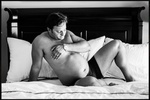It's been kind of crazy around the workfront, and the tabs and posts are piling up at DTHQ. Meanwhile, some other dads have been typing up a whirlwind of great stuff:
The Atlantic's tech guy Alexis Madrigal is back from paternity leave, which he spent contemplating the eternal mystery that is taking and posting picture of your kid:
Which itself is a variation on a widely held belief among particular classes of Americans that one's physical and digital lives should be kept distinct, largely so the inferior digital one doesn't pollute the purity of one's embodied experienced.Few episodes are more amenable to this analysis than taking care of a newborn. You can't text a baby a diaper change or tweet your way to a breastfeeding. Rearing a tiny mammal is as bodily as it gets.
Yet, I've been struck by how much imagination parents bring to bear on our tiny infants. A newborn is, and I'd imagine always has been, a creation of the mind, at least in part.
And sitting right at this interface of the bodily and the imaginary are our photographs.
Twitter Is Weird--and Other Things Fatherhood Taught Me [theatlantic]
Matthew Baldwin, meanwhile, spent October writing about his family's experience with his 9yo son's autism. The posts, which thread through Baldwin's blog, Defective Yeti, and are all together at A Month of Son, are a must-read for anyone who's ever watched their kid do something and just wondered, "Dude, wtf?" Here's just one excerpt about the complications of anecdote and empiricism:
When we began seeking treatment options for our son, we were inundated with suggestions from friends and family and casual acquaintances, ranging from the benign (vitamins) to the severe (chelation therapy). Each recommendation came with an assurance that the treatment had worked wonders for someone, be it the child of the speaker, or a son of a friend, or a kid they had read about on the internet.A Month of SonThese suggestions were well-meaning, and I sincerely appreciated the motives of those who made them, but they also gave me fits. Anecdotal evidence is anathema to disciples of the scientific method such as I, but in the fledgling field of autism treatment it was all anyone had to offer. And everything was proposed as possible treatments: dietary modification, craniosacral therapy, acupuncture, magnets, auditory integration training, horseback riding, supplements, pharmaceuticals, homeopathic tinctures. Pretty much every form of medicine, Western or Eastern or complementary or alternative, has at one time or another been championed as aiding, or even "curing", those with autism.
But who really knows?



